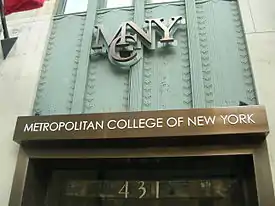Metropolitan College of New York
Metropolitan College of New York (MCNY), formerly Audrey Cohen College, is a private college in New York City.[3] MCNY is accredited by the Middle States Commission on Higher Education and consists of three schools: The Audrey Cohen School for Human Services and Education, the School for Public Affairs and Administration, and the School for Business.[4]
 | |
| Type | Private college |
|---|---|
| Established | 1964 |
| Endowment | $0.6 million (2016)[1] |
| President | Joanne Passaro[2] |
| Students | 1,059[1] |
| Location | , , United States |
| Campus | Urban |
| Colors | Red and White |
| Website | www |
History
The college was founded in 1964 by educational pioneer Audrey Cohen as the Women's Talent Corp and was renamed the College for Human Services in 1970, when it was granted a charter by the New York State Board of Regents. It started offering business programs in 1983. Soon after, in 1988, the college added its first graduate program: a Master of Administration (today a Master of Public Administration). In 1992, the college was renamed Audrey Cohen College in honor of its founder. It gained its current name in 2002.[5]
In 2012, the associates and bachelor's degree in Business Administration and all MBA programs at Metropolitan College of New York were accredited by the Accreditation Council for Business Schools and Programs. In addition, 2012 marked the MCNY re-opening of the Bronx Extension Center, located at 529 Courtlandt Avenue, offered students living in surrounding areas a convenient campus where they could attend classes.[6]
In 2016, MCNY moved to new locations in the Financial District of Manhattan and the Melrose area of the South Bronx.[7][8]
Academics
The highest degrees offered are master's degrees. The college follows founder Audrey Cohen's Purpose-Centered Education philosophy. In contrast to colleges and universities that organize the school year according to semesters, MCNY refers to each term as a "purpose". Each term's purpose, or unifying theme, drives the coursework for the term, which includes a Constructive Action (CA). The Purpose determines the focus for the Constructive Action that students are required to plan, implement, and evaluate. That Action must relate to the semester’s Purpose and improve the lives of individuals and institutions outside the classroom. CAs are unique student projects that combine classroom study with research-fieldwork projects that integrate lessons learned in all of the term's courses with hands-on experience.[4]
Campus
Metropolitan College of New York has two locations, the main campus, part of a building in lower Manhattan, and a second campus, also part of a building, in the Bronx.
In 2016, the college moved into a new Manhattan campus, away from its previous rented space in Manhattan on Canal Street.[9][10] MCNY purchased three floors of the commercial condominium at 40 Rector Street in Manhattan, with 110,000 square feet of space and an entrance at 60 West Street. MCNY purchased the sixth, seventh and eighth floors of the 19-story building with a $68 million loan.[11][12] The college also moved to a new Bronx campus at 463 East 149th Street.[13] The new Bronx campus is a 26,000 square foot, part of a building, and has the capacity to serve approximately 500 students.[14][15]
International field study
The MBA programs at MCNY have an international field study experience in their curricula and the experience is an inherent part of these curricula. This action-oriented experience is tailored to ensure that students have the opportunity to work collaboratively in a pan-cultural environment in which they are exposed to new cultures and given the opportunity to explore them. Students enrolled in the MBA programs (Media Management, Financial Services, Health Services and Risk Management or General Management) will participate in the trip based on their credits completed and academic progress.
The field study's goal is to immerse students in the global business environment and students participation are required as this is necessary to develop and apply the skills required to work effectively in the global economy. As part of the required international practicum course, students will be afforded the opportunity to work in a consultative capacity with an operating enterprise to address one or more existing business challenges.[16]
References
- https://www.usnews.com/best-colleges/metropolitan-college-190114
- http://www.metropolitan.edu/about/pres1.php
- "Idealist.org:Metropolitan College of New York". Retrieved October 15, 2019.
- "Why MCNY web page". Retrieved April 26, 2018.
- "Our History: MCNY". Retrieved April 26, 2018.
- "Metropolitan College of New York Re-Opens its Doors in the Bronx". Archived from the original on June 17, 2016. Retrieved October 15, 2019.
- "MCNY press release". June 8, 2016. Retrieved October 12, 2016.
- "Metropolitan College opens new campus at Triangle Hub". September 20, 2016. Retrieved October 12, 2016.
- http://www.manhattantimesnews.com/mcny-on-the-movemcny-en-movimiento/
- "MCNY home page". Retrieved May 24, 2016.
- https://www.mcny.edu/blog/2016/06/08/metropolitan-college-of-new-york-mcny-officially-opens-new-state-of-the-art-manhattan-campus/
- https://therealdeal.com/2014/08/19/search-for-new-campus-leads-metropolitan-college-to-rector-street/
- "MCNY opens Bronx Campus". September 7, 2016. Retrieved October 12, 2016.
- http://thebronxchronicle.com/2016/09/20/metropolitan-college-of-new-york-unveils-state-of-the-art-bronx-campus/
- http://amsterdamnews.com/news/2016/sep/15/metropolitan-college-opens-south-bronx-cmapus/
- http://www.mcny.edu/business/generalstudyabroad.php?mystudy=general
Further reading
- Grace G. Roosevelt, Creating a College That Works: Audrey Cohen and Metropolitan College of New York, SUNY Press, 2015.
External links
| Wikimedia Commons has media related to Metropolitan College of New York. |